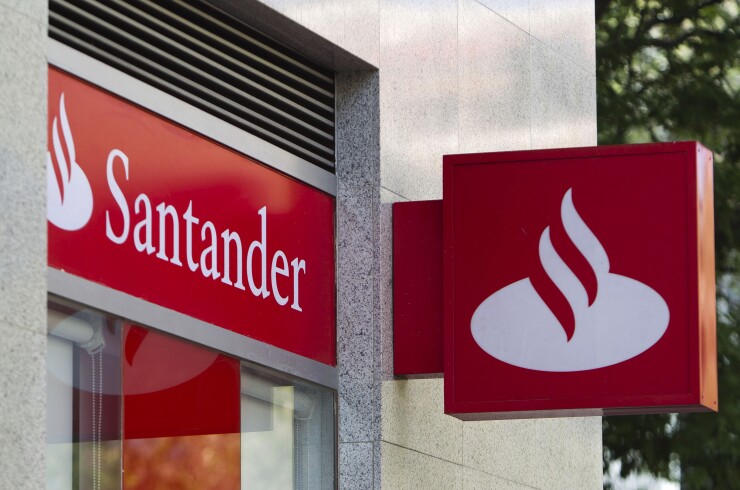
More banks are offering payroll flexibility to secure relationships with business clients. But they must tread carefully to stay on the good side of pending regulations.
Santander recently partnered with DailyPay to offer earned wage access (EWA) for commercial banking clients in the U.S. Several other banks have also embraced EWA, and regulators are starting to pay greater attention to this product.
Consumers use EWA to access part of their salaries before the scheduled payday. Consumers get funds faster, but also receive less on payday because of the early access. Santander is positioning EWA partly as a way to address the growth of faster payment processing, which may require consumers to have funds available closer to the time that a bill is due. The growth of real-time settlement is also contributing to consumer demand that they receive payroll payments faster, the bank contends.
"Access to information, merchandise and services is increasingly instant," said Greg Murray, managing director and head of payables and receivables product management for Santander Commercial Banking. "Think of the internet, same day delivery, ride hailing services. This same expectation is now making its way into workers' expectations with respect to pay."
Santander's EWA partner, DailyPay, is part of a growing market of EWA fintechs that have traditionally dominated the market. EWA gained steam during the pandemic, partly as a way to recruit workers to fill
As the Spanish bank Santander
"Providing transparency and earned wage access will serve as an impactful tool for our business clients," Murray said. "The businesses can offer their employees greater control over their finances and, in so doing, improve their ability to compete more effectively for top talent, increase employee satisfaction and retain more of their workforce."
Banks are also using EWA as a way to manage overdrafts, which addresses
"It's a huge advantage for banks to be able to help consumers and achieve their own migration away from overdraft fees," said Rob Nardelli, director of commercial banking for DailyPay, which also partners with PNC and TD Bank to offer EWA. "These partnerships are a way for us to increase our own profile."
But while regulators are pressuring banks to reduce overdraft fees, they are also paying more attention to EWA, which does not fall under a specific federal regulation or regulatory agency. Similar to buy now/pay later lending, another product designed to enable consumers to meet short-term expenses, EWA has been criticized as potentially creating unforeseen financial stress for users.
Last month,
"There is a blind spot with EWA in the regulation, whether you consider it to be a money transmitter or a loan service," said Aurelie L'Hostis, a principal analyst at Forrester Research. "There needs to be a better legal framework around EWA. The problem now is it's not bracketed with legal constraints."
While EWA providers position themselves as an alternative to payday lending, critics say EWA lending can cause consumers to face liquidity challenges.
"There are good actors in this space, but there are also things like subscription fees and other charges," said Marshall Lux, a researcher for the Mossavar-Rahmani Center for Business and Government at the Harvard Kennedy School of Government.
The Center released a study last month that found that 75% of EWA users access the product for regular expenses, as opposed to emergencies, and APRs for some EWA products are as high as 400%.
"Our survey finds a number of people are substituting it for payday lending," Lux said.
Santander did not provide comment on pending regulations, adding there is no fee for accessing EWA with a lead time of one to three days. Instant payments carry a $3.49 fee, DailyPay said.
"At DailyPay, we work every day in states with a broad coalition of consumer protection advocates, regulators, responsible industry competitors, and others, on a balanced path forward that carefully regulates our industry in a way that prioritizes our customers," said Ryan Naples, director of public policy at DailyPay, in an email.






